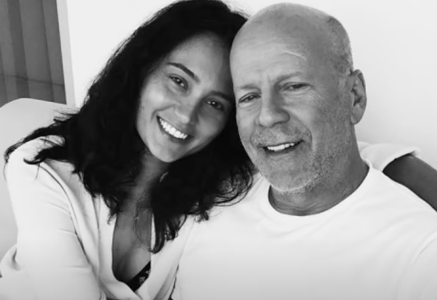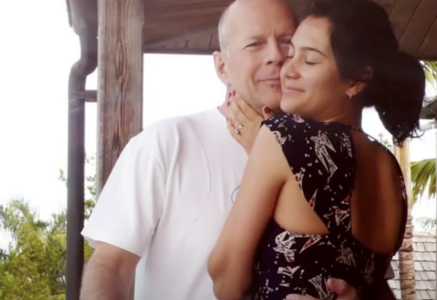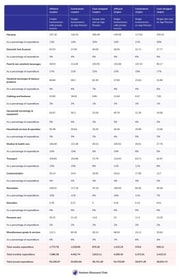Are you missing this overlooked sign of dementia? What Bruce Willis’ wife wants everyone to know
- Replies 0
When we think of Bruce Willis, most of us picture the wisecracking action hero from Die Hard, always ready with a quip and a twinkle in his eye.
But behind the Hollywood glitz, Bruce and his family have been facing a very different kind of battle—one that’s all too familiar to many Australian families.
And as his wife, Emma Heming Willis, recently revealed, the first signs weren’t what you might expect.
When we hear 'dementia,' most of us immediately think of memory loss.
But as Emma shared in a heartfelt interview, the earliest warning signs for Bruce were much more subtle—and, in some ways, more alarming.
The man known for his warmth and lively conversation suddenly seemed subdued.
'For someone who is really talkative, very engaged, he was just a little more quiet, and when the family would get together he would kind of just melt a little bit,' Emma recalled.

It wasn’t just a case of being tired or distracted. Bruce began losing words, and a childhood stutter returned.
He seemed distant, less affectionate, and not quite himself. 'He felt very removed, a little cold, not like Bruce, who is very warm and affectionate. To go the complete opposite of that was alarming and scary,' Emma said.
Bruce’s diagnosis: frontotemporal dementia (FTD). Unlike Alzheimer’s, which is the most common form of dementia and usually starts with memory loss, FTD attacks the parts of the brain responsible for personality, behaviour, and language.
That means the first changes are often in how someone acts or interacts with others—not what they remember.
FTD is rare, accounting for about one in 20 dementia cases. It tends to strike earlier, with the average age of onset around 60, compared to Alzheimer’s, which usually affects people over 65.
In Australia, as in the US, FTD is still not widely understood, and research is only just beginning to catch up.
Dr Bruce Miller, a leading neurologist, describes the impact: 'Imagine a marriage that has been tight and beautiful and suddenly the person that you’re living with has no empathy or concern for you or your family.'
The person with FTD often isn’t aware of the changes, because the parts of the brain that allow us to self-reflect are affected early on.

It’s easy to dismiss subtle changes in personality or behaviour as stress, depression, or just 'getting older.' But as Emma’s story shows, these can be the first red flags.
The Alzheimer’s Association notes that in FTD, 'behavioural changes are often the first noticeable symptoms,' while in Alzheimer’s, these changes usually come later.
Neurologist Dr W Chris Winter, commenting on recent photos of Bruce, noted that people with FTD often seem 'frozen' or disconnected, even in the company of loved ones.
'He wasn’t engaged in the photo-taking process, so he was just a little bit more disconnected,' Dr Winter said, recalling his own family’s experience with the disease.
Over time, FTD causes more areas of the brain to deteriorate. Eventually, symptoms can resemble those of late-stage Alzheimer’s: difficulty eating or swallowing, trouble walking, and increased vulnerability to infections.
Most people with FTD need full-time care within three to five years of diagnosis.
While FTD itself isn’t directly fatal, complications like pneumonia or respiratory failure can be life-threatening.
There’s currently no cure, but some medications and therapies can help manage symptoms and improve quality of life.
Source: Good Morning America / Youtube.
Despite the challenges, Emma says Bruce is still 'really mobile' and in good health overall—'it’s just his brain that is failing him.'
The family has adapted, finding new ways to communicate and connect. 'We’ve learned to adapt and we have a way of communicating with him, it’s just a different way,' she shared.
There are still moments when Bruce’s old self shines through—a laugh, a look, a glimmer of that famous twinkle.
'As quickly as those moments appear, then it goes. It’s hard, but I’m grateful that my husband is still very much here,' Emma said.
If you’re concerned about dementia, there are resources available right here in Australia. Dementia Australia (dementia.org.au) offers information, support, and a helpline (1800 100 500) for anyone affected by dementia.
And remember, you’re not alone—many families are walking this path together.
Read more: 'He has been good at covering it up': Actor's family shares 'overlooked' signs of dementia

Have you or someone you love experienced subtle changes like those described by Emma Heming Willis? What were the first signs you noticed? How did you adapt? Share your stories and tips in the comments below!
But behind the Hollywood glitz, Bruce and his family have been facing a very different kind of battle—one that’s all too familiar to many Australian families.
And as his wife, Emma Heming Willis, recently revealed, the first signs weren’t what you might expect.
When we hear 'dementia,' most of us immediately think of memory loss.
But as Emma shared in a heartfelt interview, the earliest warning signs for Bruce were much more subtle—and, in some ways, more alarming.
The man known for his warmth and lively conversation suddenly seemed subdued.
'For someone who is really talkative, very engaged, he was just a little more quiet, and when the family would get together he would kind of just melt a little bit,' Emma recalled.

Bruce Willis’ wife, Emma Heming Willis, revealed that the earliest and most subtle symptoms of his frontotemporal dementia (FTD) were personality changes. Image source: Good Morning America / Youtube.
It wasn’t just a case of being tired or distracted. Bruce began losing words, and a childhood stutter returned.
He seemed distant, less affectionate, and not quite himself. 'He felt very removed, a little cold, not like Bruce, who is very warm and affectionate. To go the complete opposite of that was alarming and scary,' Emma said.
Bruce’s diagnosis: frontotemporal dementia (FTD). Unlike Alzheimer’s, which is the most common form of dementia and usually starts with memory loss, FTD attacks the parts of the brain responsible for personality, behaviour, and language.
That means the first changes are often in how someone acts or interacts with others—not what they remember.
FTD is rare, accounting for about one in 20 dementia cases. It tends to strike earlier, with the average age of onset around 60, compared to Alzheimer’s, which usually affects people over 65.
In Australia, as in the US, FTD is still not widely understood, and research is only just beginning to catch up.
Dr Bruce Miller, a leading neurologist, describes the impact: 'Imagine a marriage that has been tight and beautiful and suddenly the person that you’re living with has no empathy or concern for you or your family.'
The person with FTD often isn’t aware of the changes, because the parts of the brain that allow us to self-reflect are affected early on.

Frontotemporal dementia, which Willis was diagnosed with in 2023, generally strikes at a younger age than Alzheimer’s and primarily affects behaviour, personality, and language abilities rather than memory in the early stages. Image source: Good Morning America / Youtube.
It’s easy to dismiss subtle changes in personality or behaviour as stress, depression, or just 'getting older.' But as Emma’s story shows, these can be the first red flags.
The Alzheimer’s Association notes that in FTD, 'behavioural changes are often the first noticeable symptoms,' while in Alzheimer’s, these changes usually come later.
Neurologist Dr W Chris Winter, commenting on recent photos of Bruce, noted that people with FTD often seem 'frozen' or disconnected, even in the company of loved ones.
'He wasn’t engaged in the photo-taking process, so he was just a little bit more disconnected,' Dr Winter said, recalling his own family’s experience with the disease.
Over time, FTD causes more areas of the brain to deteriorate. Eventually, symptoms can resemble those of late-stage Alzheimer’s: difficulty eating or swallowing, trouble walking, and increased vulnerability to infections.
Most people with FTD need full-time care within three to five years of diagnosis.
While FTD itself isn’t directly fatal, complications like pneumonia or respiratory failure can be life-threatening.
There’s currently no cure, but some medications and therapies can help manage symptoms and improve quality of life.
Source: Good Morning America / Youtube.
Despite the challenges, Emma says Bruce is still 'really mobile' and in good health overall—'it’s just his brain that is failing him.'
The family has adapted, finding new ways to communicate and connect. 'We’ve learned to adapt and we have a way of communicating with him, it’s just a different way,' she shared.
There are still moments when Bruce’s old self shines through—a laugh, a look, a glimmer of that famous twinkle.
'As quickly as those moments appear, then it goes. It’s hard, but I’m grateful that my husband is still very much here,' Emma said.
If you’re concerned about dementia, there are resources available right here in Australia. Dementia Australia (dementia.org.au) offers information, support, and a helpline (1800 100 500) for anyone affected by dementia.
And remember, you’re not alone—many families are walking this path together.
Read more: 'He has been good at covering it up': Actor's family shares 'overlooked' signs of dementia
Key Takeaways
- Bruce Willis’ wife, Emma Heming Willis, revealed that the earliest and most subtle symptoms of his frontotemporal dementia (FTD) were personality changes such as becoming quieter, less engaged, and emotionally distant—quite different to the memory loss typically associated with Alzheimer’s.
- Frontotemporal dementia, which Willis was diagnosed with in 2023, generally strikes at a younger age than Alzheimer’s and primarily affects behaviour, personality, and language abilities rather than memory in the early stages.
- Medical experts say FTD patients often lack awareness of their changing behaviour, and over time, the disease can cause severe issues such as speech loss, movement difficulties, and an increased risk of infections, eventually needing full-time care.
- There is currently no cure for FTD, but some treatments can help with symptoms; Willis’ family has adapted to new ways of communicating as his language wanes, expressing gratitude for the moments when his personality shines through.
Have you or someone you love experienced subtle changes like those described by Emma Heming Willis? What were the first signs you noticed? How did you adapt? Share your stories and tips in the comments below!







